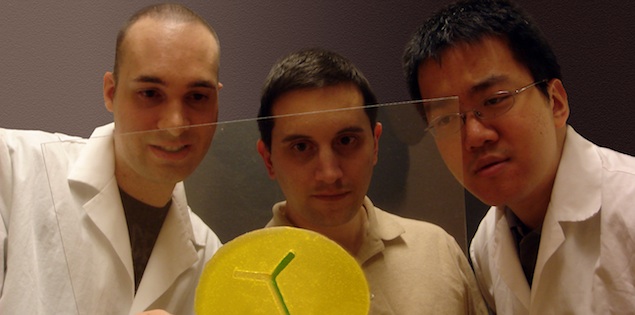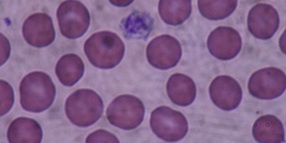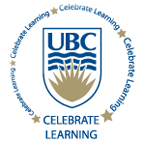| ISSUE 05/2010 01 Events + Featured 02 Blood Cells Get Detailed Family Tree 03 Genomic 'Haircut' 04 Carl Weiman Takes Up White House Post 05 Class Connections + Kudos |
 |
UBC Science Connect |
| NEWS AND EVENTS FOR UBC SCIENCE ALUMNI | VIEW HTML VERSION |

|
Always Room for Jello in Science EducationTony Yang has always had a passion for science education. But even he couldn't have guessed that his love of teaching would one day involve jello. After graduating from UBC with a General Science degree in 2008, Yang is now pursuing his PhD. His UBC experience has enabled him to couple his interest in science education with his thesis, which explores chemical and biological engineering and microfluidics. Microfluidics is about controlling the flow and reaction of a small amount of fluids within a tiny area. This inter-disciplinary field has spurred advances in physics, engineering, microtechnology and biotechnology with innovations such as lab-on-a-chip and DNA chips. So where does the jello come in? Yang explains that the process of pouring jello into a mold was often used as an analogy to soft-lithography, which is the process typically used to make microfluidic chips out of elastomeric materials. Professor Eric Lagally, Yang's supervisor, Yang and fellow PhD student Eric Ouellet worked to create a simple, fun and inexpensive method for teaching microfluidics, and began using jello in their demonstrations during community outreach activities at UBC's Michael Smith Laboratories (MSL). |


Beaty Biodiversity Museum Opens October 16
Come celebrate BC's biodiversity! Interact with the collections, view the blue whale, watch videos, and explore hands on. We look forward to welcoming you! UBC Apple Festival The War Against Chemical Weapons Watcher of the Sky |
 |

UBC, Max Planck Formalize Partnership
UBC has forged a formal partnership with the Max Planck Society, Germany's foremost basic research institution and home to 32 Nobel prizes. The agreement commits both institutions to conducting joint research projects in Canada and Germany, and to increasing scholarly exchanges. "Today's agreement represents a joining of great strengths within both the Max Plank Society and UBC and will provide the underpinning for future research in advanced materials science," said Prof. Toope. "The knowledge and discoveries generated from these collaborations will profoundly change the lives of present and future generations." |

Microbial Mystery in Cave of Crystals |
|

|
UBC biologists Curtis Suttle and Danielle Winget are part of a team of scientists investigating the microbial life living in tiny air pockets in the crystals of Mexico's Cave of Crystals. See photos of the expedition and find out more about the cave's microbial mysteries in National Geographic's new documentary Into the Lost Crystal Caves. |

Charting a More Detailed Family Tree for Blood Cells |
||
|
UBC researchers have mapped what is likely the most comprehensive profile of microRNA expression across the hematopoietic hierarchy--the collection of primitive and differentiated cell types that develop from a common blood-forming stem cell. Hematopoietic stem cells--found in bone marrow--are self renewing and have the ability to differentiate into all of the different mature blood cell types through a series of intermediate progenitor cell types.  |
 |
MicroRNAs are short RNA molecules that play a critical role in orchestrating this 'family tree' of cellular development. MicroRNAs usually silence, or turn off, genes at various stages of differentiation. "How miRNA expression is controlled at each stage of the hierarchy is an important biological question for understanding this element of control," says Carl Hansen, Assistant Professor with Physics and Astronomy, UBC's Centre for High Throughput Biology (CHiBi) and Michael Smith Laboratories. "Although there have been numerous studies of specific microRNA types in a few cell types, this study provides the first unified and comprehensive data set. We really wanted to see the big picture of how the microRNA expression is changing at each stage of differentiation." |

Celebrate Learning at UBC |
|

|
Celebrate Learning is a week-long initiative October 23 to 31, 2010. The event seeks to honour and celebrate teaching and learning experiences across UBC Vancouver, and to highlight and promote student learning and development opportunities. Join us for open lectures, information sessions, poster sessions, workshops and more. |

Genomic 'Haircut' Makes World's Tiniest Genome Even Smaller |
||
|
The world's tiniest nuclear genome appears to have "snipped off the ends" of its chromosomes and evolved into a lean, mean, genome machine that infects human cells, according to research published by University of British Columbia scientists. Until recently, E. cuniculi, a parasitic fungus commonly found in rabbits that can also be fatal to immunocompromised humans, has been widely regarded as having the smallest known nuclear genome. At 2.9 million base pairs (Mbp) and approximately 2,000 genes, the genome of E. cuniculi is less than one-two thousandth the size of the human genome.  |
 |
But now, a team of researchers led by UBC Botany Professor Patrick Keeling sequenced the genome of a closely related parasite that makes the E. cuniculi genome seem positively king-sized. The genome of E. intestinalis, a sister species of E. cuniculi that infects human intestines, is 20 per cent smaller, at only 2.3Mbp. "On one end of the spectrum, genomes can get larger almost without limit, but there is a limit to how small they can get – they can't be less than zero," says Keeling, whose work is published in Nature Communications. "And the question that fascinated us was in an already tiny genome, what else can be lost?" "The chromosomes are long threads of DNA, and in E. intestinalis its almost as though it got a haircut, removing hundreds of genes, but all from the ends of the threads." |

The Unreasonable Effectiveness of Data: How Billions of Trivial Data Points Can Lead to Understanding |
|

|
Peter Norvig's (Director of Research, Google) talk, part of the UBC Department of Computer Science's Distinguished Lecture Series, is now on YouTube.
Somewhere in the range of millions or billions of examples, we pass a threshold where hopeless data suddenly becomes effective. |

UBC Science Professor Carl Wieman to Take Up White House Post |
||
|
The United States Senate has confirmed University of British Columbia professor and Nobel Laureate Carl Wieman for the position of Associate Director for Science in the White House Office of Science and Technology Policy.  |
 |
Wieman joined UBC's Faculty of Science in 2007 as Professor of Physics and Director of the Carl Wieman Science Education Initiative (CWSEI) to transform science teaching and learning at UBC and beyond. "The CWSEI has made an indelible impact on thousands of UBC students and we have no doubt Carl will affect wider change in science education in American schools through his new role," said UBC President Prof. Stephen Toope. "We wish him the best in Washington and look forward to him rejoining us." |

Field School Reunion |
|

|
This September, EOS graduates from 1960 to 1989, along with family and friends, gathered to celebrate and to revisit a piece of their UBC history. Over sixty UBC alumni and friends attended the reunion. Guests were welcomed with a barbecue at the Field School and had the opportunity to tour the Field School facilities. Alumni swapped stories, visited local wineries, reminisced and made new memories. See the photos from the weekend on Flickr. |

UBC Science Likes You |
|

|
Visit us on Facebook and you can like us too! Connect with classmates, share stories and updates and discover what's new by checking out the UBC Science page on Facebook. We'll be posting news from the Faculty, as well as volunteer opportunities and event updates--and we promise never to tag you in any unflattering photos. |


Chris Wagner, |
 |

Vanessa Auld Joins Dean's Office
UBC Science has appointed Zoology Professor Vanessa Auld to a five-year term as Associate Dean for Faculty Affairs and Strategic Initiatives. Auld is internationally recognized for her research into the role glia (non-neuronal cells) play in the development and function of the nervous system. Her research has been published in leading science journals including Cell, Science and the Proceedings of the National Academy of Science, and is supported by the Natural Sciences and Engineering Research Council of Canada and the Canadian Institutes of Health Research. UBC Plant Evolutionary Biologist, Inorganic Chemist Elected to Canada's Royal Society Craig Hart Named Society of Economic Geology (SEG) Distinguished Lecturer Bryman to be Awarded 2011 Panofsky Prize UBC physicist Doug Bryman will receive the 2011 W. K. H. Panofsky Prize in Experimental Particle Physics. He will share the prestigious award from the American Physical Society with Laurence Littenberg, Brookhaven National Laboratory and A.J. Stewart Smith, Princeton University. |

 |
|

|
» 2008
George Albert Sawatzky, professor in the departments of Physics and Astronomy, and Chemistry, becomes the latest UBC Science fellow elected to the UK's Royal Society. He joins eight other fellows from UBC Science departments. |

 | ||
You're receiving Science Connect because, as a UBC Science alumni or supporter, you've given the university permission to contact you. And while we hope you find our e-magazine interesting, we take your privacy seriously, and have made it easy for you to: | ||
 |
||

 |
| © 2010, UBC Faculty of Science | Privacy | Update your contact information |

